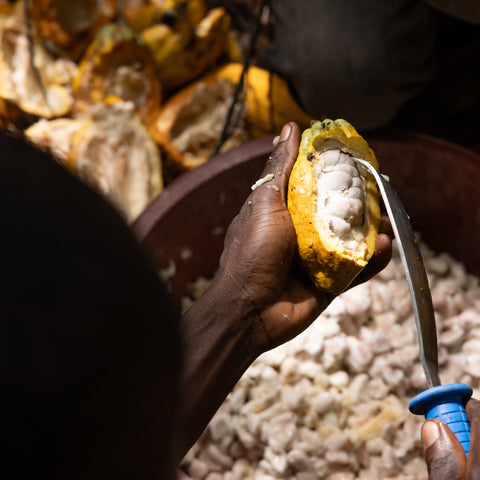Happiness is when what you think, what you say, and what you do are in harmony.” ― Mahatma Gandhi
Happy Earth Day!
If there is ever a moment that we at Grocer’s Daughter Chocolate feel like we’re living our best selves, it is at the service of others. Purposeful service is not only how we treat our family and friends here at GDC, but also what we serve to you. While chocolate may seem like a “simple, innocent pleasure”, my experience in cacao and chocolate has made me keenly aware that behind every bite of chocolate there is so much more than that. Forced child labor, ecologically unsound practices and economically abusive trade deals with farmers are the sad legacy, and still often dominate, the cacao industry today. Our mission is to create a new story for modern day chocolate, to leave a chocolate legacy that has a positive influence on our world. It’s our contribution to the fight for a healthy planet and for livelihoods that allow people to thrive.

Partnerships at Origin
Trips to origin mean we ensure that what we value is being protected in every step of the process. We value dignified trading practices, we value opportunity for women, we value quality in our products, and we value products that come from sound ecological practices. We select value chain partners that adhere to these values, too. If it sounds like a lot, it is. But that doesn’t mean it isn’t worth it. In fact, it is precisely why it is worth it.
Transparency is a cornerstone upon which many of GDC’s values lie. We can’t expect to be radically sustainable if we don’t know where the cacao we use comes from or how it’s cultivated. Being a company that sources ethical products requires that we know the source. So we spent 3 days in Esmeraldas, Ecuador talking with cacao farmers from the cooperative UOPROCAE–one of our partner cooperatives.
Here’s what stood out to us on our trip to origin.
Quality of process is quality of product
UOPROCAE’s cacao collection depot is located on a lonely stretch of road some 40 minutes away from Atacames, the tourist hub of Esmeraldas province. Across the road from the large cement building is a once tree-laden mountain currently being deforested.
“It’s for cows.” said Luis Javier Meza, UOPRCAE’s quality control technician and a local cacao farmer.
It would be nice to imagine that every industry championed ecologically sound practices as part of their process, but truthfully, not even within the cacao industry (where agroforestry is a definite buzzword) do all businesses place high value in protecting the environment.
Lucho, a nickname for Luis, showed me around the depot. “Deforestation is a huge problem that UOPROCAE takes very seriously.”We explicitly prohibit farmer members from razing forests to plant cacao, and we encourage them to plant some of the hearty woods that are native to this area.”
Off to the right side was the fermentation center, directly opposite several drying beds. For several years now Lucho has worked as the quality control manager for UOPROCAE. His work entails ensuring that the seeds (aka cacao beans) arrive fresh, remain at adequate temperatures for fermentation, regulating oxygen levels, sifting seeds around to ensure even distribution of fermentation, and removing the seeds on time. From there the seeds pass to the drying beds. There are 2 types of drying beds: those with a wooden base and those with a mesh netting.

The different drying beds are selected based on the flavor profile that the producers want to highlight in the cacao beans. Wooden bases on drying beds imbue the cacao bean with notes of wood and can be used to add astringency to chocolate.
Lucho is keenly aware of all of these nuances and is careful to pass each batch to the correct bed. When the humidity level within the seed is between 5.5% and 7% then the beans are placed into a sorter and bagged to be sold off to different buyers. Even with all of this oversight, the beans are again inspected by the buyer upon arrival to the factory. There the beans are again hand-sorted, guillotine-tested, and controlled for quality.
“What we want is for the fermentation process to produce these grooves that you can see here. This means the fermentation process has been done well and the flavors within the bean are most noticeable.” Lucho told me.
Before reaching the fermentation center the farmers must care for the cacao trees. While some organizations fell trees to make room for cacao, there is a need for working with the forests that are already there. UPOPROCAE and its member farmers respect and understand that – making them ideal partners.
Agents of change
Of the farmers I met on my trip to Esmeralda, most of them were women.

The brain and back of an entire cacao operation can (and often is) a woman. And even when there is a man present, the role played by women at the organizational level is irrefutable.
Yet according to Cacao Barometers 2022 report gender equality remains rare even today: Gender inequality remains the rule rather than the exception in many cocoa growing regions. This is deeply problematic, both because gender equality is a rights issue of itself, but also because women are change agents in and of themselves. Creating gender equality is one of the smartest and most effective ways to tackle a wide range of problems, from deforestation through child labour to raising household income.
What is particularly unique about the women I met on this trip to origin was the fact that they were often the driving force behind major projects such as UOPROCAE’s women’s group, youth group and even more organization-wide practices such as preservation of trees and forest regeneration.
In a short interview I had with Yuleisi Elizabeth Mesa Cabrera (pictured in center) she explained her involvement in the young farmers project, women’s group, and her work as a field technician for UOPROCAE. “In just the base organization of APROCA there are 30 young women involved,” she told me. “In UOPROCAE there are roughly 60 young women involved in many different roles.”

The role of women as change agents is clear. Working alongside organizations that push for women to step up, and that compensate them accordingly and fairly, is one part of why trips to origin are so important. Equity is critical to sustainability. Yuleisi went on to mention how UOPROCAE looks to establish gender equality practices as an organization. “We have received many training sessions from organizations on gender equality and we try to make sure that women have the same rights as men in our organizations.” Great strides are being made thanks to conscientious consumers.
If it is true, and we are what we eat–our hope is that each individual that enjoys Grocer’s Daughter Chocolate becomes ever more ethical, authentic, and loving. That is the source of our product, and we take great care to ensure that from the farm to your table the quality of process is beneficial for the planet and its care-takers.




